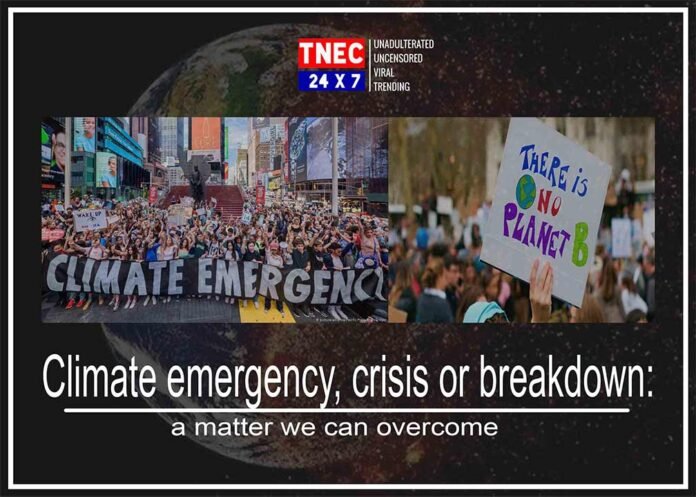Article by: Shalini Deb Roy, The North-Eastern Chronicle
Visual by: Pallab Neog
The conditions of weather prevailing in an area in general or over a long period is termed as ‘climate’, and the climate change is causing a wide range of impacts that will affect virtually every human on Earth in increasingly severe ways.

The magnitude of each impact depends on the collective choices as well as details, like the particular region and the people residing over there, but together the range of impacts makes climate change one of the most urgent issues facing humanity at present.
Also read: “Code red for humanity”: UN’s climate change panel reports
Various studies and reports surrounding the matter and its impacts worldwide

More than three decades ago, a collection of scientists assembled by the United Nations first warned that humans were fueling a dangerous greenhouse effect and that if the world didn’t act collectively and deliberately to slow Earth’s warming, there could be “profound consequences” for people and nature.
According to a major UN scientific report, various human activities are changing the climate in unprecedented and sometimes irreversible ways. The UN chief calls findings ‘a code red for humanity’ with worse climate impacts.
The report also assumes significance for India because, for the first time, it will provide a localised outlook, with maps and atlas.
And, the country of India has seen severe impacts of climate change, right from devastating floods, a spate of cloudbursts in Uttarakhand and Himachal Pradesh, and deadly lightning incidents.
The sprawling assessment, as compiled by 234 authors relying on more than 14,000 studies from around the globe, bluntly lays out for policymakers and the public the most up-to-date understanding of the physical science on climate change.
Moreover, the report on climate change sets out the harsh reality of global warming. Arising from the excessive rise in temperatures, raging wildfires to devastating floods the world has witnessed it all in recent years.
Devastating effects of change in climate
When carbon dioxide (CO2) is released into the atmosphere, it acts as a blanket, preventing heat from escaping. The buildup of CO2 leads to one of the most obvious impacts of climate change, a hotter world.
The rise in temperatures is linked to almost all of climate change’s most severe impacts, including more frequent and intense heatwaves, widespread crop failures, and dramatic shifts in animal and plant ranges.
Moreover, this extreme heat has become increasingly common. It will become even more intense in the years to come. This has serious implications for people, communities, and infrastructure.
If carbon emissions continue to increase further, then by end of the century, the hottest daily temperatures that occur in a given year in the United States are likely to increase by at least 10°F as compared with the end of the 20th century. Also, other parts of the world may experience even worse scenarios.
As the temperature increases, ice sheets and glaciers melt and ocean water expands. This produces a rise in sea level, which can disrupt and damage coastal communities and infrastructure in every sea-bordering country in the world.
Though there are different estimates if emissions increase the world could experience up to eight feet of sea-level rise towards the end of the century. For, e. g., The Gulf of Mexico and the East Coast of the United States are experiencing some of the world’s fastest rates of sea-level rise.
However, it is not just coastal areas: climate change is also linked with heavier and more frequent rainfall, leading to destructive inland flooding in regions like the Midwest.
Also, mega-storms like Hurricane Harvey have gone from occurring once every 100 years, to once every 16 years.
In dry areas, global warming is linked with longer, more extreme, and more frequent droughts, and a longer fire season thus making corn, wheat, and other chief crop supplies less stable, leading to price spikes and food shortages.
Almost 800 million people currently living in extreme poverty will be most affected.
By the end of the century, sea-level rise alone could displace more than 100 million people.
These migrations, as well as conflicts over increasingly limited resources, will exacerbate existing political and social tensions, further leading to the risk of conflict and war.
Along with people, the animals, insects, and plants, already threatened by habitat destruction and pollution—will suffer even worse.
The only real uncertainty that remains, its authors say, is whether the world can muster the will to stave off a darker future than the one it already has carved in sone.
But, there is hope that deep cuts in emissions of greenhouse gases could stabilise rising temperatures.
The UN Secretary-General António Guterres repeating the scientists’ findings said, “If we combine forces now, we can avert climate catastrophe.” And, while concerning the report he said, “There is no time for delay and no room for excuses. I count on government leaders and all stakeholders to ensure COP26 is a success.”
The fact that has to be kept in mind is that it is in our hands to make a better future, it is the responsibility of every individual the contribution to a healthy and pollution-free environment.












